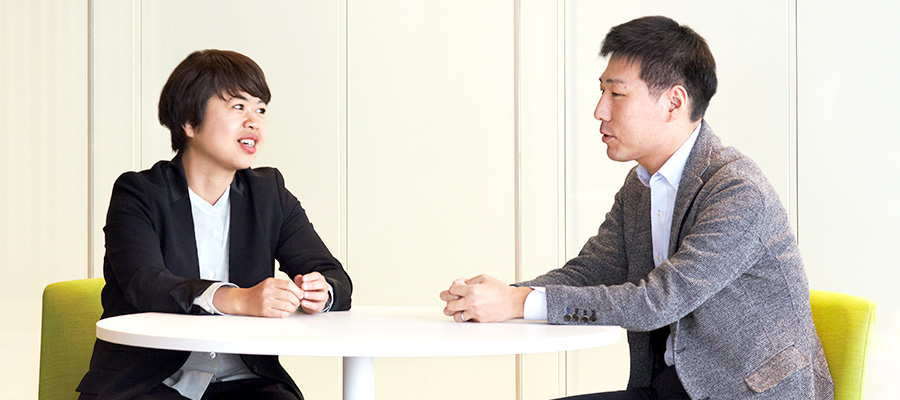Drawing out the strength of engineers: The challenge of bit Labs
Mar. 07, 2019
Nomura Research Institute (NRI)'s “bit Labs” is an organization that supports customers' business expansion and new businesses through digital transformation (DX) using digital technologies. To learn about system development, we asked Eiko Miyamae and Akihisa Ohi, system consultants at bit Labs who work together with strategic consultants to support customers, about the characteristics of the organization's development style.
Manufacturing that "appeals to consumers" learned in overseas training
―― How does bit Labs promote development?
Miyamae: At bit Labs, we have sought to create an organization that carries out fast and good quality manufacturing. However, if development begins by giving excessive priority to speed or form while leaving vague the question of what value to provide to whom and for what purpose, then the PoC (Proof of Concept) may not function effectively. We are working to develop systems that take the end user's perspective into account, including design thinking and other factors, and that directly contribute to sales growth and customer service.
―― How do you use design thinking?
Ohi: For example, suppose a customer wants to carry out a MaaS (Mobility as a Service) business. Since this cannot be immediately commercialized, we must first specify what we want as our USP. Design thinking is used for this purpose. We conduct many user interviews to throw up issues, think about ideas, and make an initial hypothesis about the kind of app that would attract users. From here, we continue repeating our hypothesis study, and when the concept is finalized, we manufacture the product and launch it in the market to get feedback. This cycle is run at high speed.
―― It is quite different from large-scale core system development. How did you learn a new development style?
Ohi: I participated in a 3-month long innovation training program held in San Francisco in 2017. We were encouraged in many practical activities such as developing new apps using design thinking, showing them to local end users, and presenting them to investors. In many cases, system development is basically "making what customers ask for," but this training changed our awareness to "making new things on one’s own." Recently, the sense of passive engineering has diminished, and we have begun to think about how we can create and contribute to our customers' businesses while taking their opinions into consideration.
The trinity of consultants, engineers, and designers
―― bit Labs seems to be developing in the "consolution" style.
Miyamae: In conventional development projects, consultants were in charge of formulating business strategies and systemization plans, and system engineers were in charge of creating an efficient system for implementing these strategies. In this way, they worked together by passing the baton for each phase of the project. Today, however, we must carry out new business planning, development support, IT implementation, and service design in parallel and repeatedly evaluate and verify them. Consultants who think about business strategies and system engineers who develop systems work together with customers to create and promote new businesses. NRI calls this "consolution"*.
I believe that NRI's unique strength lies in bringing together members capable of consulting, engineering, and service design in intermediate areas, and forming a team with a flat relationship. In order to realize the concept, it is necessary for us to finally manufacture products, i.e., to convert them into IT, and to have the energy and the ability to continue to improve and implement them. I am insistent on persevering until this is achieved.
Ohi: It is also important for team members to understand each other's areas in order to successfully advance consolution. For example, I have also learned about marketing and business development so that I can understand the ideas of strategic consultants. Strategic consultants also learn a considerable amount of IT-related work.
We want to build an NRI-style “100-day development model”.
―― What kind of challenges do you want to take up in the future?
Ohi: I have always wanted to present new products that I think are "good" to the world, and now I am close to that. If you have accumulated experience in developing large-scale systems in the past, you will know the security and quality considerations that make you different from a venture. In the future, in addition to our existing development experience, we hope to further increase the number of engineers who can provide design thinking and other skills, and expand the scope of our activities.
Miyamae: Today, we are looking into ways to manufacture everything from service design to digital products in 100 days. I don't think the world as a whole has yet been able to reduce what needs to be reduced, omit what can be omitted, and shorten turnaround times. NRI's production innovation headquarters alone, which operates bit Labs, has hundreds of cutting-edge human resources who can leverage new digital technologies. I would like to make full use of these assets to create an original "100-day development model".
*Consolution: A model in which consulting and solutions run in tandem with customers from the planning and conception stage, and business is created by repeatedly testing hypotheses.

Eiko Miyamae(L), Akihisa Ohi(R)







